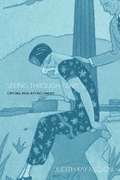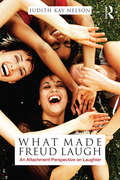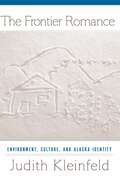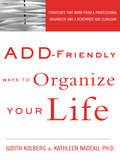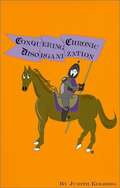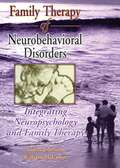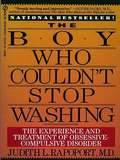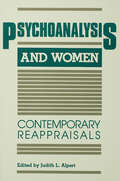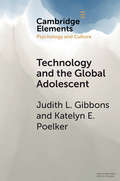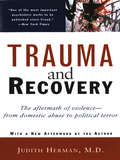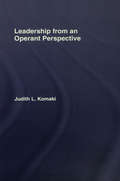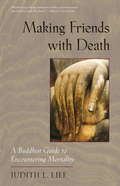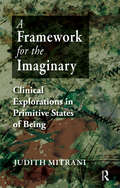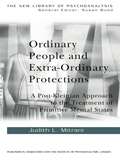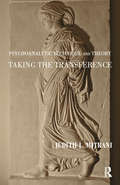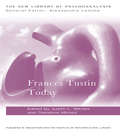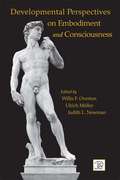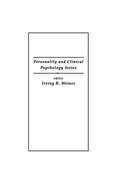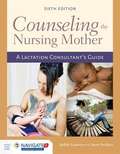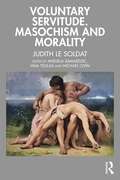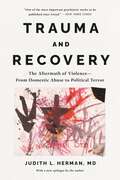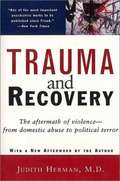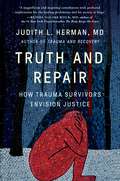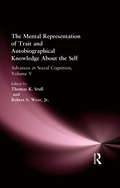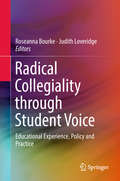- Table View
- List View
Seeing Through Tears: Crying and Attachment
by Judith Kay NelsonSeeing Through Tears is a groundbreaking examination of crying behavior and the meaning behind our tears. Drawing from attachment theory and her own original research, Judith Nelson presents an exciting new view of crying as a part of our inborn equipment for establishing and maintaining emotional connections. In a comprehensive look at crying through the life cycle, this insightful volume presents a novel theoretical framework before offering useful and practical advice for dealing with this most fundamental of human behaviors.
What Made Freud Laugh: An Attachment Perspective on Laughter
by Judith Kay NelsonIn her characteristically engaging style, Nelson explores a topic that has fascinated and frustrated scholars for centuries. Initially drawn to the meaning of laughter through her decades of work studying crying from an attachment perspective, Nelson argues that laughter is based in the attachment system, which explains much about its confusing and apparently contradictory qualities. Laughter may represent connection or detachment. It can invite closeness, or be a barrier to it. Some laughter helps us cope with stress, other laughter may serve as a defense and represent resistance to growth and change. Nelson resolves these paradoxes and complexities by linking attachment-based laughter with the exploratory/play system in infancy, and the social/affiliative system, the conflict/appeasement, sexual/mating, and fear/wariness systems of later life. An attachment perspective also helps to explain the source of different patterns and uses of laughter, suggests how and why they may vary according to attachment style, and explain the multiple meanings of laughter in the context of the therapeutic relationship. As she discovers, attachment has much to teach us about laughter, and laughter has much to teach us about attachment. This lively book sheds light on the ways in which we connect, grow, and transform and how, through shared humor, play, and delight, we have fun doing so.
The Frontier Romance: Environment, Culture, and Alaska Identity
by Judith KleinfeldAnyone curious about what drew people like Christopher McCandless (the subject of Into the Wild) and John Muir to Alaska will find nuanced answers in Frontier Romance, Judith Kleinfeld’s thoughtful study of the iconic American love of the frontier and its cultural influence. Kleinfeld considers the subject through three catagories: rebellion, redemption, and rebirth; escape and healing; and utopian community. Within these categories she explores the power of narrative to shape lives through concrete, compelling examples—both heart-warming and horrifying. Ultimately, Kleinfeld argues that the frontier narrative enables Americans—born or immigrant—to live deliberately, to gather courage, and to take risks, face danger, and seize freedom rather than fear it.
ADD-FRIENDLY Ways To ORGANIZE Your Life
by Kathleen Nadeau Judith KolbergOrganizing books fall short of addressing the unique needs of adults with ADD. They fail to understand the clinical picture of ADD and how it impacts the organizing process, often making their advice irrelevant or frustrating when put into practice. Books about ADD may address organization/disorganization but do so in a cursory fashion and on a very small scale. This is a book that has ADD-Friendly advice with the ADD-er in mind. This collaboration brings forth the best underlying understanding with the most effective and practical remedy from ADD experts in two important fields-professional organization and clinical psychology. Finally, it offers organizing advice that ranges from self-help to utilizing the help of non-professionals, to using professional assistance. Thus it permits the listener to decide where they are personally in the organizing process, and what level of support will be most beneficial to their unique situation.
Conquering Chronic Disorganization
by Judith KolbergThe real-life stories of chronically disorganized people and the ground breaking, easy-to-learn organizing methods used to end their chronic disorganization in the area of residential clutter, office organizing, paper management, storage, and time management.
Family Therapy of Neurobehavioral Disorders: Integrating Neuropsychology and Family Therapy
by William G. McCown Judith L JohnsonFamily Therapy of Neurobehavioral Disorders shows you a unique integration of neuropsychology and family therapy. Authors Judith L. Johnson and William G. McCown span these two broad areas by synthesizing family therapy principles and applying them specifically to traumatic brain injury and degenerative dementia. Family therapists, neuropsychologists, social workers, and counselors working with patients who experience brain dysfunction and their families learn to better address common issues and problems and of therapeutic interventions. This expert book includes case examples and working models of family reactions. The book then extends this information into practical clinical situations commonly confronted in work with these patients and their families. Readers of Family Therapy of Neurobehavioral Disorders are introduced to brain-behavior relationships including neuroanatomy of the brain as it relates to behavior, dynamics of neurologic disorders, and common symptoms of brain dysfunction. You can then use this information to help persons with traumatic brain injury and their families cope with and adjust to the issues and challenges they face. Specifically, you gain invaluable, informative insight into: the neuroanatomy of the brain and which structures mediate behavior, emotion, and cognition common issues families face when a member suffers traumatic brain injury therapeutic strategies and practical suggestions for assisting families mild head injury and familial reactions common issues faced by families confronting Alzheimer’s disease or other dementias a model of family reactions to dementia over timeChapters in Family Therapy of Neurobehavioral Disorders outline symptoms of brain dysfunction and family therapy designed to approach these symptoms. Divided into two sections, the book gives readers a model of traumatic brain injury beginning with the initial onset and proceeding through time. This section focuses on changes within the family and therapeutic strategies for helping these distressed families. Secondly, the authors address degenerative dementia with emphases on certain phases through which family members may progress as they acknowledge their loved one’s condition and then therapeutically work through the reality of it. Professionals in the medical and social sciences will find Family Therapy of Neurobehavioral Disorders a unique and irreplacable guide for developing and understanding the meshing of neuropsychology and family therapy. Also, the book serves as a solid text for students in courses such as rehabilitation, counseling, and family therapy.Translated into Spanish!
The Boy Who Couldn't Stop Washing
by Rapoport Judith L.One boy spends six hours a day washing himself-and still can't believe he will ever be clean Another sufferer must check her stove hundreds of times daily to make sure she has turned it off And one woman, in an effort to ensure that her eyebrows are symmetrical, finally plucks out every hair All of these people are suffering from Obsessive-Compulsive Disorder (OCD), an emotionally crippling sickness that afflicts up to six million Americans. Cleaning, counting, washing, avoiding, checking-these are some of the pointless rituals that sufferers are powerless to stop. Now a distinguished psychiatrist and expert on OCD reveals exciting breakthroughs in diagnosis, succesful new behaviorist therapies and drug treatments, as well as lists of resources and references. Drawing on the extraordinary experiences of her patients, Dr. Judith Rapoport unravels the mysteries surrounding this irrational disorder . . . and provides prescriptions for action that promise hope and help. .
Psychoanalysis and Women: Contemporary Reappraisals
by Judith L. AlpertWithin the psychoanalytic framework, there is a growing body of research and thinking about female development. In addition, there is ongoing research within other areas of psychology, such as developmental psychology and social psychology, which has important implications for an understanding of women's adult development. Often these research findings are not readily available to the analytic community, nor has much of the research been incorporated into a psychoanalytic framework. Psychoanalysis and Women broadens analytic thinking by integrating contemporary literature from psychoanalysis with that of other areas, both within and outside psychology, which has implications for the undertanding of women's development. This literature is conceptualized within a psychoanalytic framework. A basic premise underlying this book is that psychoanalysis needs continuing review and revision in terms of what women and men are about and a continuing focus on whether and how unfounded biases prevent analysts from understanding patients. The present volume considers how sexism and feminism are affecting psychoanalysis and exemplifies how the emerging field of psychoanalysis of women and the issues its existence raises should be conceptualized. It also exemplifies some of the positive contributions that a feminist outlook gives to the study of human behavior and should esxpand the range of hypotheses that we have about people.
Technology and the Global Adolescent (Elements in Psychology and Culture)
by Judith L. Gibbons Katelyn E. PoelkerAround the world, adolescents use technology for education, to further their identity and socio-emotional development, to access health information, engage in civic activities, and for entertainment. For many, technological advances, especially social media, have drastically influenced how they communicate with family, friends, and romantic partners. Challenges of technology use include the digital divide, internet addiction, and exposure to cyberbullying. The diversity of adolescents' cultural context results in heterogeneous bidirectional influences of technology and teenagers with respect to education and close relationships. Researchers, parents, and policy makers must consider the role of culture in the complex interactions of teenagers with technology.
Trauma and Recovery
by Judith L. HermanWhen Trauma and Recovery was first published in 1992, it was hailed as a groundbreaking work. In the intervening years, Herman's volume has changed the way we think about and treat traumatic events and trauma victims. In a new afterword, Herman chronicles the incredible response the book has elicited and explains how the issues surrounding the topic have shifted within the clinical community and the culture at large.Trauma and Recovery brings a new level of understanding to a set of problems usually considered individually. Herman draws on her own cutting-edge research in domestic violence as well as on the vast literature of combat veterans and victims of political terror, to show the parallels between private terrors such as rape and public traumas such as terrorism. The book puts individual experience in a broader political frame, arguing that psychological trauma can be understood only in a social context. Meticulously documented and frequently using the victims' own words as well as those from classic literary works and prison diaries, Trauma and Recovery is a powerful work that will continue to profoundly impact our thinking.
Leadership: The Operant Model of Effective Supervision (People and Organizations)
by Judith L. KomakiHow can managers motivate their employees? After conducting detailed field studies of work groups in settings as diverse as insurance company offices and regatta sailboats, Judith Komaki has identified two key behaviours that seem to distinguish effective from ineffective managers; monitoring workers' performance and communicating consequences. Drawing on her research over the last ten years, Komaki combines behavioural and cognitive theories of leadership and puts forward a new model for the study of leadership from an operant perspective.
Making Friends with Death: A Buddhist Guide to Encountering Mortality
by Judith L. LiefIn Making Friends with Death, Buddhist teacher Judith Lief, who's drawn her inspiration from the Tibetan Book of the Dead, shows us that through the powerful combination of contemplation of death and mindfulness practice, we can change how we relate to death, enhance our appreciation of everyday life, and use our developing acceptance of our own vulnerability as a basis for opening to others. She also offers a series of guidelines to help us reconnect with dying persons, whether they are friends or family, clients or patients.Lief highlights the value of relating to the immediacy of death as an ongoing aspect of everyday life by offering readers a variety of practical methods that they can apply to their lives and work. These methods include:Simple mindfulness exercises for deepening awareness of moment-by-moment changePractices for cultivating loving-kindnessHelpful slogans and guidelines for caregivers to useMaking Friends with Death will enlighten anyone interested in coming to terms with their own mortality. More specifically, the contemplative approach presented here offers health professionals, students of death and dying, and people who are helping a dying friend or relative useful guidance and inspiration. It will show them how to ground their actions in awareness and compassion, so that the steps they take in dealing with pain and suffering will be more effective.
A Framework for the Imaginary: Clinical Explorations in Primitive States of Being
by Judith L. MitraniAn extraordinary depiction of one analyst's efforts to receive and respond to the vivid impressions of her patients raw and sometimes even unmentalized experiences as they are highlighted in the transference-countertransference connection. Mitrani attempts to feel, suffer, mentally transform, and, finally, verbally construct for and with the patient possible meanings for those immediate versions of lifes earliest experiences as they are re-enacted in the therapeutic relationship.She uses insights from this therapeutic work to contribute to the metapsychology of British and American object relations as well as to the psychoanalytic theory of technique. In these eleven essays, Dr Mitrani masterfully integrates the work of Klein, Winnicott, Bion and Tustin as she leads us on an expedition through primitive emotional territories. She clears the way toward detecting and understanding the survival function of certain pathological manoeuvres deployed by patients when confronted by unthinkable anxieties. In her vivid accounts of numerous clinical cases, she provides and demonstrates the tools needed to effect a transformation of unmentalized experiences within the context of the therapeutic relationship.
Ordinary People and Extra-ordinary Protections: A Post-Kleinian Approach to the Treatment of Primitive Mental States (The New Library of Psychoanalysis #Vol. 40)
by Judith L. MitraniMany people come to analysis appearing quite 'ordinary' on the surface. However, once below that surface, we often come into contact with something quite unexpected: 'extra-ordinary protections' created to keep at bay any awareness of deeply traumatic happenings occurring at some point in life. Judith Mitrani investigates the development and the function of these protections, allowing the reader to witness the evolution of the process of transformation, wherein defensiveness steadily mutates into communication. She lucidly and artfully weaves detailed clinical with a variety of analytic concepts, and her original notions - including 'unmentalized experience' and its expression in enactments; 'adhesive pseudo-object relations' and the way in which this contracts and compares with normal and narcissistic object relations - provide valuable tools for understanding the infantile transference/countertransference and for the refinement of our technique with primitive mental states. Ordinary People and Extra-Ordinary Protections will prove stimulating and accessible in its style and substance to a broad analytic readership, from the serious student of psychoanalysis to the most seasoned professional.
Psychoanalytic Technique and Theory: Taking the Transference
by Judith L. MitraniThis volume consists of a series of essays inspired by Freud's paper on Jensen's novel Gradiva - "she who steps along." In the story a young archaeologist, Norbert Hanold, suffers from delusions but is able to unravel the mysteries of his emotional life and mind with the aid of a woman who does not challenge these delusions, but rather "steps along" with Hanold, gradually helping him to disentangle truth from fantasy, through what Freud called "cure by love". Gradiva, originally felt to be the source of Hanold's malady, eventually becomes the agent of its resolution and of his return to health. This extraordinary tale formed the basis for the author's concept of "taking the transference". Through clinical vignettes, various aspects of psychoanalytic technique - useful from the first encounter between patient and analyst and throughout the process of the development of mind to termination - are illustrated in detail.
Frances Tustin Today (New Library of Psychoanalysis)
by Judith L. Mitrani and Theodore MitraniFrances Tustin Today explores some of the ways and means by which Tustin’s work has enabled psychoanalytic clinicians to enter into the elemental domain of sensation: what Bion called the ‘proto-mental’ area of the psyche-soma. Through detailed clinical contributions of several of her exponents worldwide, this book demonstrates how her ideas -- rooted in decades of work with children on the autistic spectrum -- have influenced and are being expanded, extended and applied to the treatment of ordinary patients from early childhood through adulthood. The contributors to this volume represent a selection of the contemporary thinking that organically grew out of Tustin’s discoveries, and show that Tustin's model has added new dimensions to the fields of infant observation, family therapy and neuro-psychology. Each chapter is augmented by demonstrable clinical experience. Frances Tustin Today is a valuable resource for psychoanalysts, psychotherapists, educators and parents who are interested in learning more about this uniquely independent clinical observer's findings and their impact upon the treatment of autistic states in children, adolescents and adults by contemporary workers in the field of mental health. Judith L. Mitrani, and Theodore Mitrani, are Fellows of The International Psycho-Analytical Association, Training and Supervising Psychoanalysts at The Psychoanalytic Center of California in Los Angeles. They are founding members of the Board of Trustees of The Frances Tustin Memorial Trust, and authors, editors, translators and teachers in the private practice of psychoanalysis and psychoanalytic therapy with Adults and Children in Los Angeles, California.
Developmental Perspectives on Embodiment and Consciousness (Jean Piaget Symposium Ser.)
by Ulrich Müller Willis F. Overton Judith L. NewmanUntil recently, the body has been largely ignored in theories and empirical research in psychology, particularly in developmental psychology. Recently however, several conceptions of the relation between body and mind have been developed. Common among these conceptions is the idea that the body plays an important role in our emotional, social, and
Coping With Loss
by Susan Nolen-Hoeksema Judith Larson Judith M. LarsonCoping With Loss describes the many ways in which people cope with the death of someone they love. Most earlier books on bereavement have fallen into two categories: distillations of the clinical experience of individual therapists or collections of chapters reporting the results of empirical studies. Each category is valuable but has tended to serve a narrow group of readers--practitioners with particular theoretical orientations or researchers in quest of the latest findings. Coauthored by a leading research psychologist and an experienced therapist who specializes in bereavement education and intervention, this book is different. The authors weave together the strands of theory, research, and clinical wisdom into a seamless and readable narrative. While they discuss previous work, they also present new data, never before published, from one of the largest studies of bereaved people ever conducted, the Bereavement Coping Project. Unlike most studies to date, which focused on only one type of bereaved group (usually widows or widowers), the Bereavement Coping Project examined the experiences of several different groups during the first l8 months after the death. The groups included those who had lost a spouse, a parent, an adult sibling, or a child; and those who had lost their significant other to cancer or cardiovascular disease on one hand as opposed to the stigmatized disease of AIDS on the other. The book begins with a critical overview of theories of bereavement; succeeding chapters explore in depth the impact of specific types of loss, the impact of particular coping strategies on recovery; the impact of social supports and religion, and the special cases of children and of people who seem to grow and change for the better after a loss. A final chapter considers implications for intervention with bereaved people. Each chapter is richly illuminated with real-life examples throughout and ends with a section called "Voices" in which bereaved people describe their various attempts to cope in their own words. Insightful and informative.
Counseling the Nursing Mother: A Lactation Consultant’s Guide
by Judith Lauwers; Anna SwisherThe Sixth Edition also serves as a significant teaching tool for students, interns, and other healthcare professionals. <P><P>With an extensive glossary and bulleted lists at the end of each chapter, it is an ideal study guide for International Board Certified Lactation Consultant (IBCLC) certification and practice.
Voluntary Servitude. Masochism and Morality
by Judith Le SoldatLe Soldat’s Voluntary Servitude. Masochism and Morality presents an extraordinary analysis of masochism, the subject, death drive and sexual discourse inspired by Freudian drive theory, philosophy, gender theory, political science and mythology.This book will certainly evoke the reader’s curiosity, but even more than that it will encourage readers critical reflection on the clandestine defensive formations between the psyche and reality that, in the author’s view, obscure pleasure principle by corrupting the death drive and the body. Le Soldat presents an unprecedented formulation in psychoanalytic literature to date, one of incomparable significance not only for our clinical work, but also for critical theoretical reflection on society and its vicissitudes. As a result of their defensive stances, we encounter ‘masochistic subjects of servitude’ enclosed in a world of wars, economical rivalries, regressive brutality of consumerism, religious dependency and political mania.Drawing on the work of Freud and Adorno, and balancing theoretical and clinical material, this is essential reading for psychoanalysts, psychotherapists, and anyone who seeks to understand the concept of voluntary servitude.
Trauma and Recovery: The Aftermath of Violence, from Domestic Abuse to Political Terror
by Judith Lewis HermanWhen Trauma and Recovery was first published in 1992, it was hailed as a groundbreaking work. In the intervening years, it has become the basic text for understanding trauma survivors. By placing individual experience in a broader political frame, Judith Herman argues that psychological trauma can be understood only in a social context. Drawing on her own research on incest, as well as on a vast literature on combat veterans and victims of political terror, she shows surprising parallels between private horrors like child abuse and public horrors like war. A new epilogue reviews what has changed--and what has not changed--over two decades. Trauma and Recovery is essential reading for anyone who seeks to understand how we heal and are healed.
Trauma and Recovery: The Aftermath of Violence--from Domestic Abuse to Political Terror
by Judith Lewis Herman<p>When <i>Trauma and Recovery</i> was first published in 1992, it was hailed as a groundbreaking work. In the intervening years, Herman's volume has changed the way we think about and treat traumatic events and trauma victims. In a new afterword, Herman chronicles the incredible response the book has elicited and explains how the issues surrounding the topic have shifted within the clinical community and the culture at large. <p><i>Trauma and Recovery</i> brings a new level of understanding to a set of problems usually considered individually. Herman draws on her own cutting-edge research in domestic violence as well as on the vast literature of combat veterans and victims of political terror, to show the parallels between private terrors such as rape and public traumas such as terrorism. <p>The book puts individual experience in a broader political frame, arguing that psychological trauma can be understood only in a social context. Meticulously documented and frequently using the victims' own words as well as those from classic literary works and prison diaries, <i>Trauma and Recovery</i> is a powerful work that will continue to profoundly impact our thinking.</p>
Truth and Repair: How Trauma Survivors Envision Justice
by Judith Lewis HermanFrom one of America&’s most influential psychiatrists, an &“extraordinary&” and &“profound&” (New York Times) manifesto for reimagining justice for survivors of sexual trauma The #MeToo movement brought worldwide attention to sexual violence, but while the media focused on the fates of a few notorious predators who were put on trial, we heard far less about the outcomes of those trials for the survivors of their abuse. The conventional retributive process fails to serve most survivors; it was never designed for them. Renowned trauma expert Judith L. Herman argues that the first step toward a better form of justice is simply to ask survivors what would make things as right as possible for them. In Truth and Repair, she commits the radical act of listening to survivors. Recounting their stories, she offers an alternative vision of justice as healing for survivors and their communities. Deeply researched and compassionately told, Truth and Repair envisions a new path to justice for all.
The Mental Representation of Trait and Autobiographical Knowledge About the Self: Advances in Social Cognition, Volume V (Advances in Social Cognition Series #Vol. 5)
by Robert S. Wyer Thomas K. Srull Stanley B. Klein Judith LoftusIf there is one topic on which we all are experts, it is ourselves. Psychologists depend upon this expertise, as asking people questions about themselves is an important means by which they gather the data that provide much of the evidence for psychological theory. Personal recollections play an important role in clinical theorizing; people's thoughts, feelings, and beliefs provide the principal data for attitudinal research; and judgments of one's traits and descriptions of one's goals and motivations are essential for the study of personality. Yet despite their long dependence on self-report data, psychologists know very little about this basic resource and the processes that govern it. In spite of the importance of the self as a concept in psychology, virtually no empirically-tested representational models of self-knowledge can be found. Recently, however, several theoretical accounts of the representation of self-knowledge have been proposed. These models have been concerned primarily with the factors underlying a particular type of self knowledge -- our trait conceptions of ourselves. The models all share the starting assumption that the source of our knowledge of the traits that describe us is memory for our past behavior. The lead article in this volume reviews the available models of the processes underlying trait self-descriptiveness judgments. Although these models appear quite different in their basic representational assumptions, exemplar and abstraction models sometimes are difficult to distinguish experimentally. Presenting a series of studies using several new techniques which the authors believe are effective for assessing whether people recruit specific exemplars or abstract trait summaries when making trait judgments about themselves, they conclude that specific behavioral exemplars play a far smaller role in the representation of trait knowledge than previously has been assumed. Finally, the limitations of social cognition paradigms as methods for studying the representation of long-term social knowledge are discussed, and the implications of the research for both existing and future social psychological research are explored.
Radical Collegiality through Student Voice: Educational Experience, Policy and Practice
by Roseanna Bourke Judith LoveridgeThis book celebrates the rights of the child, through including student voice in educational matters that affect them directly. It focuses on the experiences of children and young people and explores how our educational policies, practices and research endeavours enable educators to help young people tell their own stories. The respective chapters illustrate how listening to young people can help them attain new positions of power, even though doing so often creates discomfort and requires a radical change on the part of the adult establishment. Further, the book challenges researchers, teachers and practitioners to reconsider how students are involved in research and policy agendas, and to what extent radical collegiality can create fundamental and positive changes in the lives of these learners. In recent decades, greater attention has been paid across policy, practice and research discourses to involving children more meaningfully and actively in decisions about their participation in both formal and informal educational settings. The book’s goal is to illustrate how researchers have systematically involved students in the pursuit of a richer understanding of educational experiences, policy and practice through the eyes and ears of young people, and through their own cultural lens.
